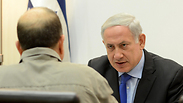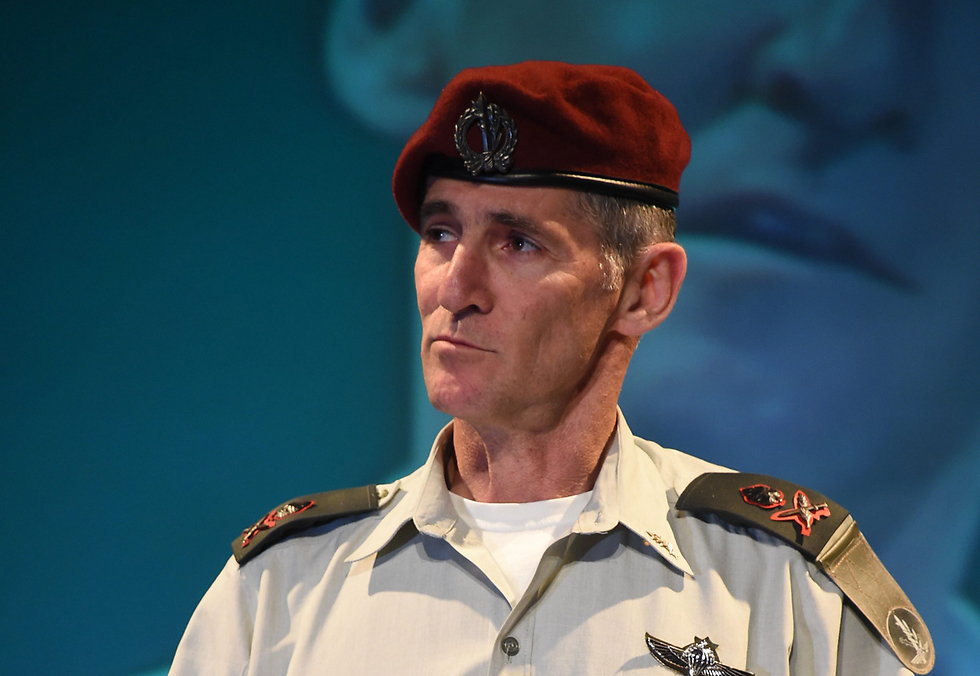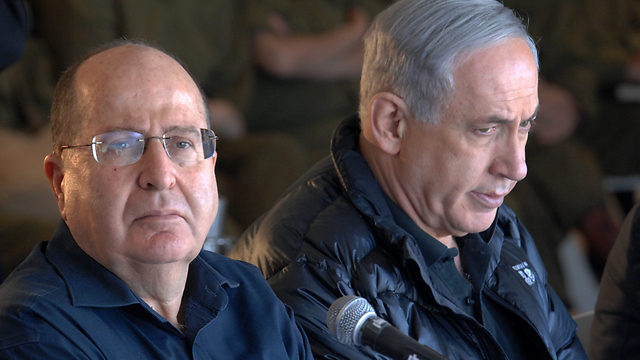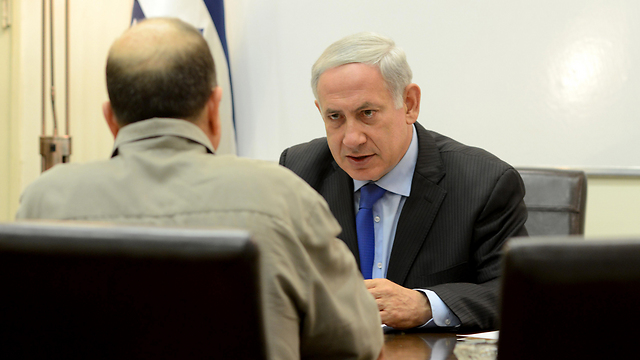
Netanyahu and Ya'alon.
צילום: לע"מ
Netanyahu and Ya'alon: To be continued
Analysis: The Prime Minister and Defense Minister have supposedly put their differences to rest, but the divide between them is deeper than it may seem. You can expect them to clash again, sooner rather than later.
"Sour" would be the best description of the atmosphere in the Prime Minister's Residence on Monday morning, as PM Benjamin Netanyahu and Defense Minister Moshe Ya'alon met. Even before the Ya'alon stepped into the house in order to explain himself and allow Netanyahu to show leadership, the PM's people understood that their attack against the Defense Minister had fizzled out. They shot too early, and missed.

This sourness took hold in the PM's office when they finally bothered to read the speech Ya'alon gave on Sunday in an Independence Day event – and suddenly it turned out that the sneaky DM had pulled the rug out from under their feet. He didn’t mention Deputy IDF Chief of Staff Yair Golan's name, and didn't speak of IDF officers' freedom of speech, but only used the old clichés common in these circumstances. He spoke generally of the honesty and integrity expected of IDF officers, as well as the openness they should display in their internal dealings. A dull, grey performance.
The text of Ya'alon's speech was given to journalists in advance, and they are the ones who created the feeling that he was about to say something dramatic, perhaps aimed at the PM. Netanyahu's office fell for it, and published a response before Ya'alon was even done. It was an embarrassing misfire that only strengthened Ya'alon's Image as a principled man fighting for important values – unlike his superior.
Netanyahu's hasty move was an expression of anger and hostility that has accumulated in his office towards Ya'alon in the past few weeks, and not just because of principled issues that have to do with the IDF's rules of engagement. Netanyahu's PR gun fired that errant shot because it's been loaded since the eve of the Israeli Holocaust Memorial day earlier in May.
Major General Yair Golan shared his historical views with the nation, and Ya'alon expressed his support for the Deputy IDF Chief of Staff, right after the PM's Office forced him to publish a clarification to Golan's message. Netanyahu's people planned on attacking Ya'alon hard for this transgression, but postponed their effort – probably due to optics concerns. After all, it doesn’t look good if you attack both a Defense Minister and an IDF Major General between two memorial days (Israel's Holocaust Memorial Day and Memorial Day for fallen soldiers and victims of hostilities happen a week apart. -ed). On Independence Day, the IDF General Staff declared the Maj. Gen. Golan crisis over. And then a new one pops up the following Sunday.
So far, it's been another round in an unsophisticated game of chess: Golan said something, Netanyahu condemned it, Ya'alon backed Golan and the result was a rough tie. As long as Netanyahu can't expand his coalition government he can't get rid of Ya'alon, and as long as Ya'alon doesn't leave the Likud party he can't rid himself of Netanyahu either – and that's before we even mention the State Comptroller's report on Operation Protective Edge, which will likely credit both of them with decisions – good and bad – made by the government.
Thet's why the tempered, somewhat laughable statement released Monday, after the two had met, should be seen as nothing more than another smoke screen: The real story of the Maj. Gen. Golan affair is hidden between the lines.
Supposedly, it all started when Maj. Gen. Golan said that there are some phenomena in Israeli society today which remind him of nationalistic and anti-democratic movements in 1930s and 1940s Europe. He didn't mean the Holocaust, and certainly didn't meant to aim this criticism at the IDF – but the attempt he made at being sophisticated with his pronouncements drew fire and encouraged far-reaching interpretations.
No one in the IDF was surprised: Golan reached his lofty position due to his skills as a commander, not his abilities as a public speaker or his views on the place modern Israel occupies in history. Each of the roles he occupied saw him hold wide-ranging opinions about what was happening around the globe, but only this year did he express some sentiments that diverge from his usual dealings – such as his views on Israeli-Turkish relations.
Minister Ya'alon came to Golan's defense not because he agrees with the General's statements, but since the attacks on Golan are another installment in a series of offensives aimed at the senior command of the IDF – mostly by the right-wing settlers, who happen to also be the basis for Prime Minister Netanyahu's grasp of power. Ya'alon could have stayed silent and let the affair die down after the IDF Spokesperson issued a statement, but he didn't, because it's in his DNA: He was, and has remained, a military man. From his first moments as defense minister, he's taken positions in support of the military, in a fashion that's almost automatic.
Ya'alon is a very inflexible political figure, and that's putting it mildly. As head of the IDF's Military Intelligence Directorate (MID, known in Hebrew as Agaf Modi'in, or Aman for short. -ed), he came to the conclusion that (former PA President) Yasser Arafat and the Palestinians are deceitful and have no intentions of reaching a real peace agreement, and ever since then it's been a steel wall for him. As far as he's concerned, Arafat and current PA President Mahmoud Abbas may as well be the same person.
Ya'alon's break with a certain faction of the settler movement – which is led by Education Minister Naftali Bennett, among others – came about during the time of the Dreinoff buildings demolition affair, which involved a legal dispute over the legality of a number of structures in the West Bank settlement of Beit El (the High Court of Justice ordered the eviction of the structures, leading to protests by settlers). Ya'alon discovered then that there are people among the general settler public who will cheat, break the law, and disgrace the IDF if it meant their ideological goals were met.

Major General Yair Golan. The controversy he awakened was just a single case in the Netanyahu-Ya'alon saga. (Photo: Yair Sagi) (צילום: יאיר שגיא)
Ever since then – another steel wall has been standing inside his mind. Whenever that group attacks IDF officers, that's war for Ya'alon. That's what happened after the Hebron shooting and that's also what happened with Maj. Gen. Golan. As far as he's concerned, it's a danger to democracy itself.
Meanwhile, Netanyahu decided to make his dissatisfaction with Ya'alon public. The reasons are political: The PM's right-wing opponents, MK Avigdor Liberman and Minister Naftali Bennett, are attacking him, and this is an opportunity to signal to the voting public that he's not thrilled with the Defense Minister's actions. But this is only part of the whole story.
Netanyahu's associates have told him that Ya'alon has said, in private conversations, that he sees himself as an eventual replacement for Netanyahu, and that he believes himself to be the only one who could bring more centrist-leaning voters to the Likud. As far as Netanyahu is concerned, this is undermining behavior, and it doesn't matter if Ya'alon – who was summoned to the PM's Residence for this reason as well – denies these statements absolutely.
Netanyahu's paranoia regarding his ministers is a central motif in his political life; the Maj. Gen. Golan affair may have subsided, but the PM's next eruption towards Ya'alon is no doubt already on its way.












